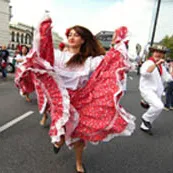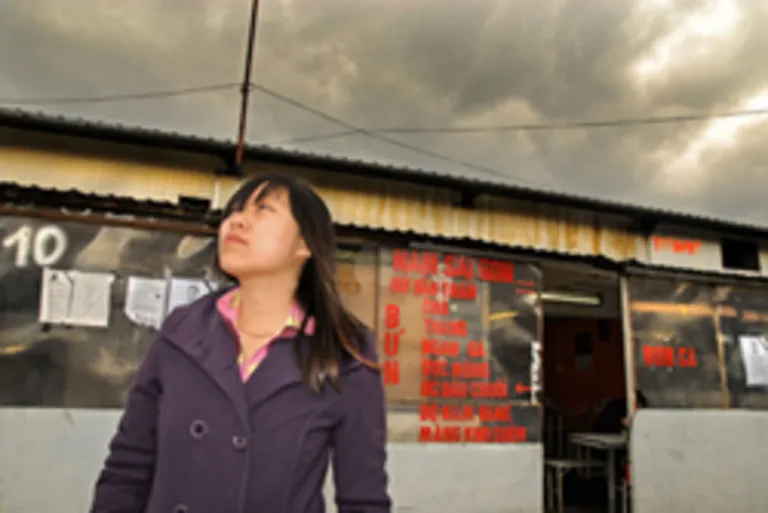One day, when I was 15 and I was coming back from school, a cyclist who was passing by spat in my direction and shouted “Fuck off, go back to Vietnam!” I felt then that something had changed and I felt proud. I was proud of Poles because it was the first time when someone recognized my nationality instead of calling me Chinese. Today an average Varsovian knows that this “gook” is most often Vietnamese. If he/she lives in Praga, Mokotów or Za Żelazną Bramą in the city center then he/she may have a neighbor who is Vietnamese. A Warsaw student surely has his/her favorite Vietnamese bar – Van Binh by the dorms of the Warsaw University, the bar by the Pola Mokotowskie subway station or maybe the bar in Torwar. A Varsovian working in an advertising agency treats his/her hangover with a chicken soup bought on the Stadium and he/she votes for the Stadium bars in the poll “Wdechy.” A Warsaw mother hears from her child about this Vietnamese girl, Ania, who has always two points more and A in Polish. Varsovians may be happy that the local sociocultural landscape is more varied thanks to the Vietnamese or they can claim that there are too many Vietnamese in the capital and that they monopolize the trade at markets. But for sure no Varsovian can deny the noticeable presence of many Vietnamese. Some of them report that one Varsovian in a hundred is Vietnamese.
An average Varsovian knows where the most numerous ethnic minority in Warsaw comes from. However, he/she is not aware of the difference caused by the fact that a stranger is from Vietnam, not from China or Japan. For a Pole, one Varsovian in a hundred may as well make jeans and use ideograms for writing. The truth is that the Vietnamese do not use ideograms and they do not make jeans. At least most of them do not. So what is the difference between the Vietnamese and other Asians who come to Poland?
The Vietnamese speak Vietnamese. It is a banal statement but I think it should be underlined because there are people who are not aware of it. Vietnamese language differs from Chinese and Japanese not only in pronunciation and grammar but also in alphabet. Vietnamese do not use ideograms but an alphabet which is based on a Latin alphabet (standard “abc”). Vietnamese resembles neither Chinese nor Japanese. Some words come from Chinese but it does not really help the Vietnamese to communicate with the Chinese. Definitely, it is much easier for a Vietnamese to learn Chinese tones because the Vietnamese language has six tones, two tones more than Chinese. Vietnamese is so melodious that it is sometimes compared to singing.
Vietnamese differ from Chinese, Japanese or Korean people in terms of physical appearance. This is another banal statement. Asians are more likely to notice the differences between the nations coming from their part of the world; however, it happens that they are wrong. There are several characteristics which, supposedly, help to determine whether a particular person is Japanese, Chinese or a representative of another Asian nation. Some of these characteristics may be really helpful; however, it is hard to say to what extent they agree with the findings of the modern biological anthropology. Supposedly, the faces of the Chinese are quite flat while the faces of the Japanese are rather round. The faces of the Vietnamese are presumably quite angular. The Vietnamese are usually more suntanned because, unlike the Japanese, they have not become obsessed with a snow-white complexion yet. According to the research on the average height of the residents of various countries, the Vietnamese are shorter than the Chinese and the Japanese. The tallest people of the Far East are the Japanese - an average Japanese man is 172 cm. Nevertheless, one must remember that the findings of the research are just an average. In China itself people differ tremendously in appearance (let alone a language). Migrations lead to the increasing number of mixed couples whose children show various degrees of resemblance to their parents.
Above all, the Vietnamese come to Poland in order to earn money, money, money. It does not always mean that they want to earn huge sums of money – mainly, they want to earn more and live better than they would in Vietnam. The Japanese who come to Poland are often scientists, musicians or businessmen who work in big companies. Many of them are students or teachers. Plenty of Chinese tradesmen work shoulder to shoulder with the Vietnamese. In theory, that could bond them but the language barrier and demanding work cause that they do not have much chance for getting to know one another. As a result, there is not much contact between these two communities outside of business.
The Vietnamese are quite candid. They do not feel intimidated by Warsaw, partly because the Vietnamese community is old and numerous. The Vietnamese quickly get used to Poland, become confident and as a result they find it easy to establish relations with other residents of the capital. I meet many “Polonized” Vietnamese who grew up in Poland and speak fluent Polish. Unlike many other Asians who are only passing through Poland and are staying here for the time being, a large number of the Vietnamese want to live and work here permanently.
The Vietnamese constitute the largest group of Asian students in Warsaw. According to the report prepared by the Warsaw Department of Education, there were 96 Vietnamese and 55 Chinese students in Warsaw. Most commonly, the Vietnamese choose Warsaw University, Warsaw University of Technology and Warsaw University of Life Sciences. On the basis of my own experience, I can risk saying that the programs which are most popular among the Vietnamese are connected with management and economics. Korean and Japanese people are more likely to come to Poland to study music. In total, in the academic year of 2008/2009 there were 2899 Asian students in Poland (including as many as 612 students from Taiwan).
The Vietnamese do not have a good taste in music. Korean, Japanese and Chinese people can appreciate and create not only classical music but also jazz, American-style pop and r'n'b. Vietnamese hits are sentimental ballads about love and longing. During wedding receptions, karaoke versions of war songs about homeland and home village are often played. Most of young Vietnamese like mainstream music and listen to pop and r'n'b.
Vietnamese cuisine is good and tasty. One must remember that meals which are served in an average bar do not really represent Vietnamese cooking – the Vietnamese do not eat such rubbish at homes. We should not be afraid to say that the Chinese eat fatty food and that Japanese cuisine is
tasteless. It is the Vietnamese that know how to combine flavors, use lots of fresh herbs and maintain a balance between meat and meatless ingredients. Greasy Peking duck or pretentious sushi served in Nowy Świat cannot be compared to phở from the Stadium.
These several basic characteristics which I have just enumerated are the things Varsovians ought to know about the Vietnamese. The Vietnamese should be perceived not only as Asians but as unique Asians. In an ideal world everyone would perceive another person as an individual and unique being. In the perception of this being the categories of age, sex or nation would not be needed. Nevertheless, we use these labels to make our lives easier. If we are going to pigeonhole others we should at least choose a correct pigeonhole.
When a Pole goes abroad, he/she does not like being mistaken for a Russian or Ukrainian. Irrespective of all complaints about the homeland and the vices of its people, everyone who lives abroad describes himself/herself as a Pole, American, Senegalese or Vietnamese. People living in East-Central Europe do not all look, live and speak the same even though they can be perceived so by the travelers from the Far East or the West. In the way in which one can claim that a Slavic soul exists, one can also describe an Asian soul or mentality. It is necessary, however, to remember about “individual manifestations” of this soul which characterize and distinguish us better than any depiction of a Slavic or Asian soul.
Text by Đàm Vân Anh
Translated by Krystyna Szurmańska












